2019 Legal Empowerment Leadership Course Diary
Publication date: December 29, 2019
Author: Yevgen Poltenko, Executive Director of Legal Development Network
Three years ago, in 2016, the Legal Empowerment Leadership Course in Budapest, Hungary instilled in my work agenda 3 important principles of this seemingly specialized but, in my deep conviction, world-changing concept:
- know/understand the law
- use the law
- shape the law
These are principles of legal empowerment, which is just as important as treating diseases, teaching children, and creating jobs. Importance of this work, increasing number of like-minded people in my homeland Ukraine and throughout the world from year to year, the practical fruits of many years’ efforts – all these things really motivate, drive and inspire.
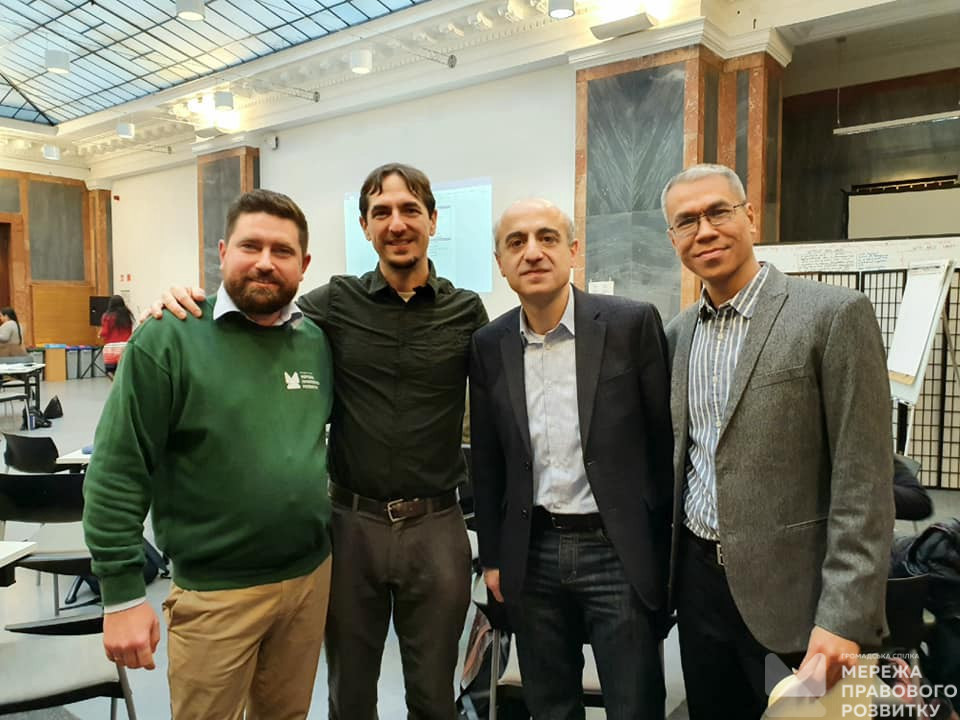
Pictured: Part of the teaching team of the course (left to right): Michael Otto (Namati), Zaza Namoradze (Open Society Justice Initiative), Marlon Manuel (Namati)
This December I again participated in the Legal Empowerment Leadership Course. This time not as a participant, but as part of an international expert team facilitating the course. During the week in Budapest filled up by brainstorming, small group discussions, case studies, visulization and ice breakers, a new wave of legal empowerment enthusiasts had a unique opportunity:
- to learn and discuss about international case studies
- to get skills building
- to apply these knowledge and skills in their country program common challenges.
5th Legal Empowerment Leadership Course in figures:
- 600+ applications
- 50+ participants
- 30+ countries
- The case of a participant from the Palestinian Territory who couldn’t even apply for a visa
The goal of the course: we are here to build a community of legal empowerment practitioners, and the course is a major component of that effort. Through the course we want to build a global core group of leaders, leaders of the movement with a common understanding of what it means to be involved in legal empowerment, the key principles of a legal empowerment program, sharing the methodology, including how we gather evidence about our successes.
Methodology of the course:
Peer-to-peer learning. While we have a very good faculty for the course, the learning is not only from the faculty but also from the participants themselves. We want you to be sharing what you are doing: not only your successes but also your failures, because we can also learn from your failures, they can help others.
Reflectiveness. Be reflective also on the experiences of the other participants, even when you are working in completely different contexts, because we are part of a global community. This is an opportunity to be away from our organizations, a good opportunity to be away from the busy activities and to have the time to reflect.
Focus on participants’ problem statements. Use your problem statement as your main question for the week: it should guide you in reflecting for the different sessions. We want you to be hopeful and be inspired with the others’ stories and presence.
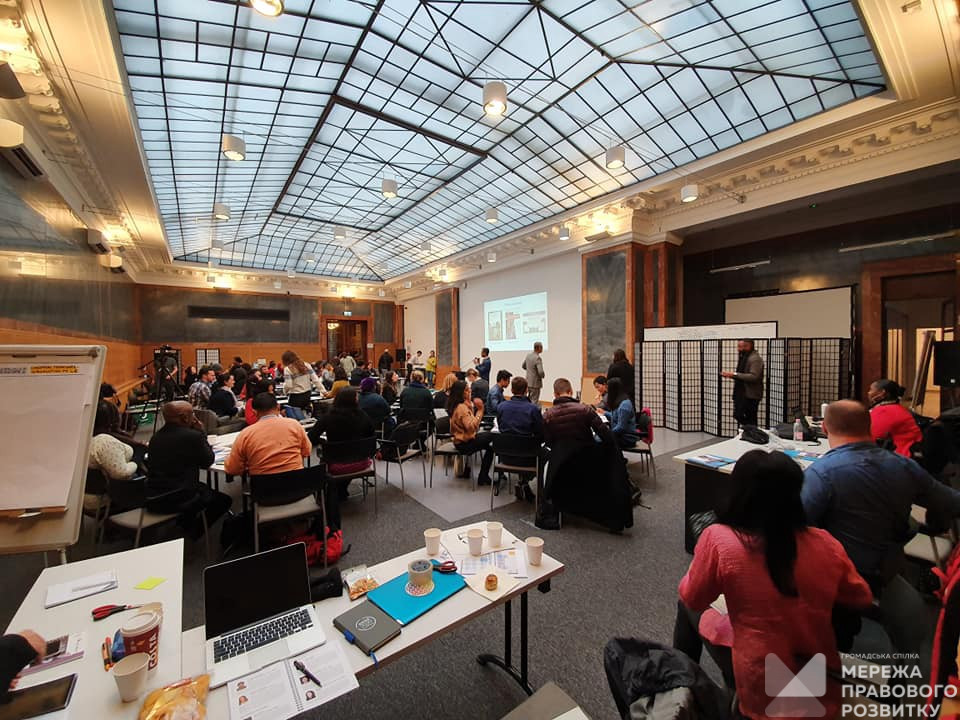
Innovations regarding past editions of the course (every year the organizers want to improve the course):
Organizational involvement. For the first time the organizers have asked participants for an endorsement from their organizations. They want participation to be organizational, institutional, it should benefit not only every participant but the organization in general, and the community, the legal empowerment field in participants’ country.
Extra time for group discussions. The organizers have extended the course to full 5 day (extra half day), because they want to give a longer time for the participants to be sharing their work and their stories.
Awards program. Last year the organizers started an awards program: 6 participants were selected to receive modest amounts as an award to help them pursue the work plan that they will be preparing as part of the course requirements. The organizers decided to proceed with a similar program this year. There will be having awards to 5 participants. The selection has not happened during the course. Part of it will be done by the participants. The final selection will be next year. All of the participants have been preparing their workplans. Based on the workplans the participants and a committee will be selecting 5 awardees.
Day 1 “To eliminate the dependence on lawyers”
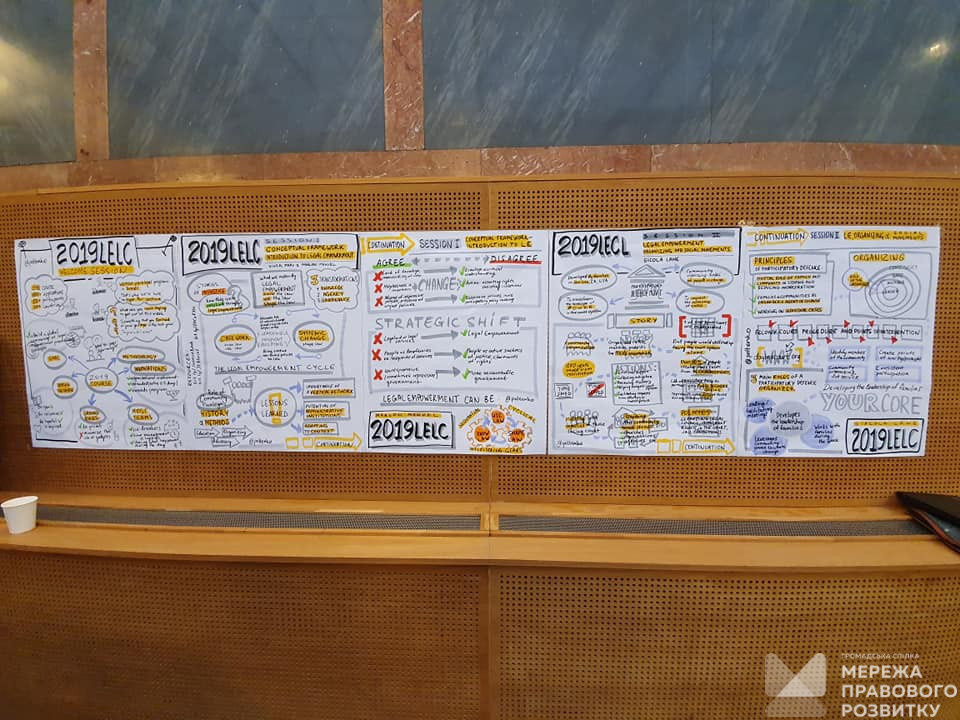
“Legal empowerment is not only about solving people’s issues, but also changing people’s perspectives and ideas regarding justice. We probably don’t need to eliminate the need for lawyers, but the dependence on lawyers”, LELC 2019 participant
The snow joined us in this very first day of the Legal Empowerment Leadership Course 2019 covering the streets in white. What happened that day? Some key highlights.
Introduction by Zaza Namoradze (Director of OSF Justice Initiative):
- The need for legal empowerment to become a global policy priority
- The need to build a global movement for legal empowerment
- The need to commit to supporting legal empowerment (including financial and other kinds of support)
Session “Conceptual framework – Introduction to legal empowerment” by Vivek Maru and Marlon Manuel
Legal empowerment is about putting the law into people’s hands so that they can know it, use it and shape it 3 transformations
- Knowledge
- Agency
- Governance
The need to demystify law, to help communities take ownership of the process. Knowing, using and shaping the law as interlocking gears that activate each other. The need to build a vertical network that connects communities, paralegals and lawyers, and to build an ongoing relationship of support with each other.
Legal empowerment is a cycle, it isn’t necessarily a sequence that goes from knowing the law, to using the law, to shaping the law, but can happen in multiple ways. When the opportunity is presented we need to seize it. Cycle of learning and movement building can be inserted into all the work we are doing. How we are exploiting the wisdom and expertise of other to inform transformation of a system and how we use it, and build movements around it.
Knowing the law: even if the law is unjust, you are still learning, knowing it, while you are doing the analysis.
Legal empowerment, organizing and social movements
Organizers facilitate and let people make their decisions.
The role of the organizer to draw people towards leadership (from constituency, to base, to member, to leader).
Participatory defense.
Reflecting on how we have done things, what would I do differently now, looking at things in a different way.
Day 2 “Each step we take is a cry for justice”
The paralegal movement in the Philippines
Рух параюристів (громадські радники) на Філіппінах
Мобілізація громади — це процес. Управнення може бути метою цього процесу.
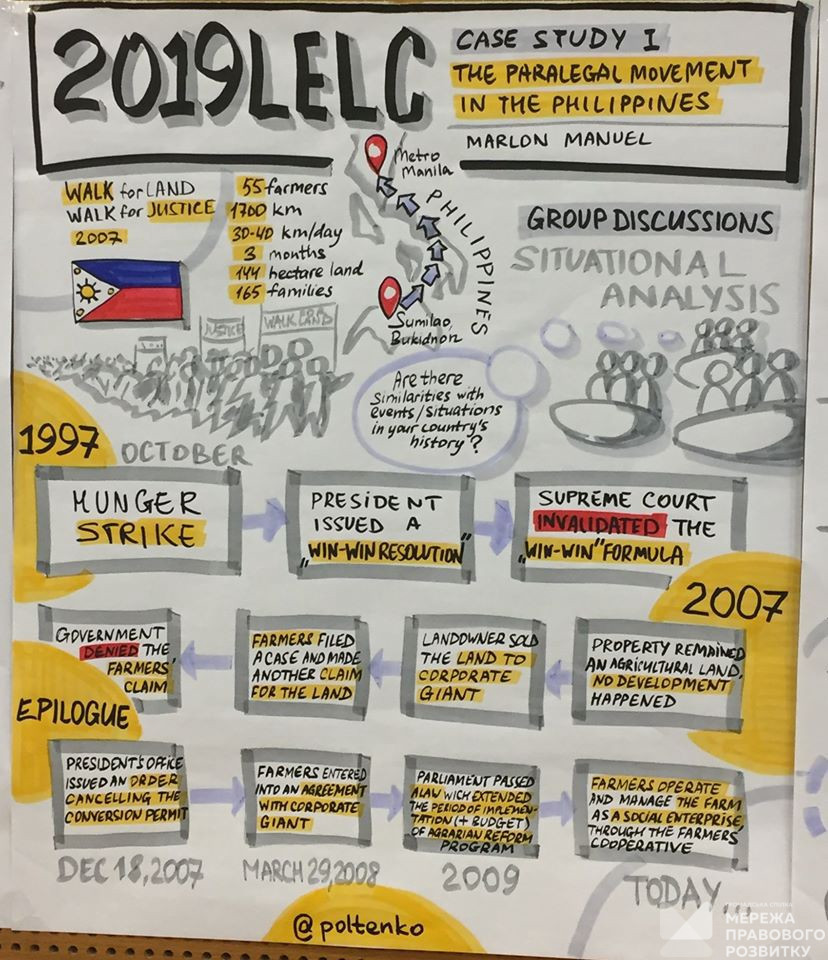
Community mobilization is a process. Legal empowerment can be the goal or the process
In the Philippines, there are 50,000 people for each judge – You need paralegals in the Philippines!
Huge organizing effort and social movement in the Philippines, paralegals working together with lawyers rather than substituting with each other.
They walked because they persisted, their persistance put pressure on the company and the government.
Session ”Community-driven data collection and analysis for advocacy”
“Data is like a hammer, you can hit yourself with it or build a house with it”
Data is necessary, but it is risky, can go wrong, you need the right data
Data gives a sense of agency
Data sovereignty: who owns it?
Data visualization tells better stories
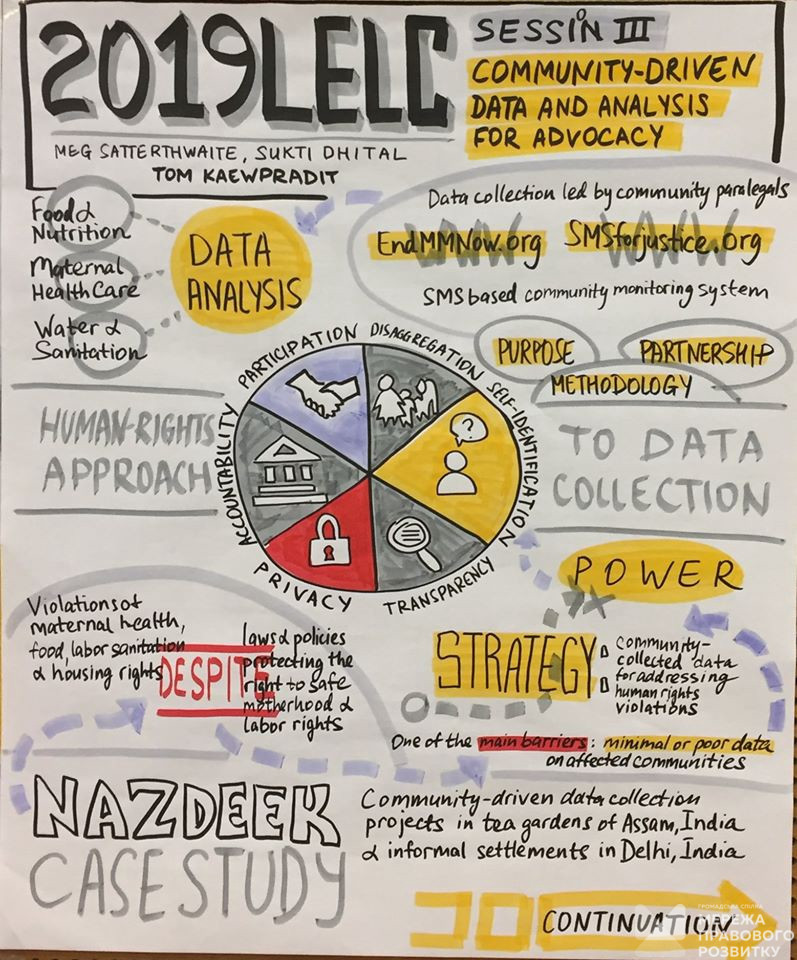
Day 3 “They is all of us”
Legal empowerment in land and environmental justice
Today participants heard about communities opposing corporations, local authorities and governments in India, Kenya and Sierra Leone whose so-called development vandalised their homes and destroyed their health. People were already angry, legal empowerment just gave them a language and a weapon to use against these hostile and sleeping authorities.
Struggles for land and environmental justice were explored not as liberal impositions from rich celebrities with nothing better to do, but as the legitimate concerns of local communities, and reflective of a deep grassroots democracy.
That’s the potential. Provided the work is led by the community, propelled by paralegals, and buttressed by lawyers. Not led by lawyers and buttressed by the community!
“When you do not act dialogically and impose your decisions, you do not empower, you manipulate”.
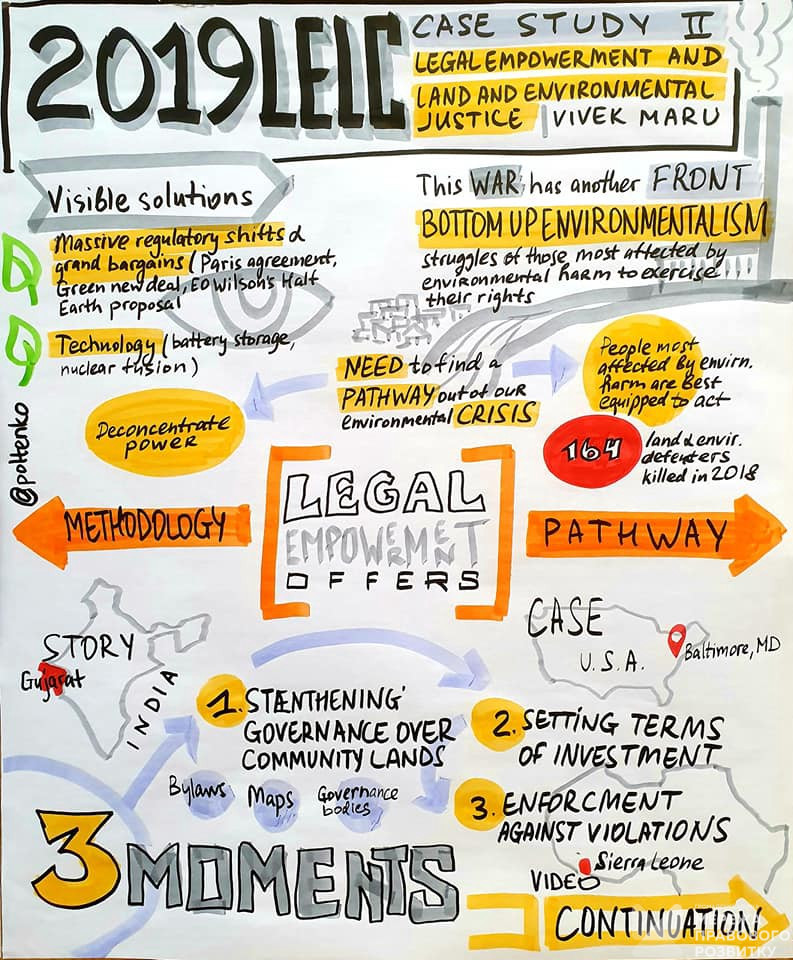
Popular education
Popular education starts with the participants themselves, expressing their problems and finding and pursuing a solution based on what they believe to be in their own best interests.
Monitoring and evaluation
M&E is not supposed to be fancy or difficult. It is supposed to be simple and useful.
Think SPICED – Subjective, participatory, interpreted and communicable, cross-checked, empowering, diverse and disaggregated.
Financing
Resources are limited and we need to think creatively about how we use money and how we make money.
The idea of relying on donor funding can become oppressive.
And raising funding from communities has radical potential. You become accountable to your community, not to donors. And people have a greater stake in the project, which becomes part of the community and not an outsider service.
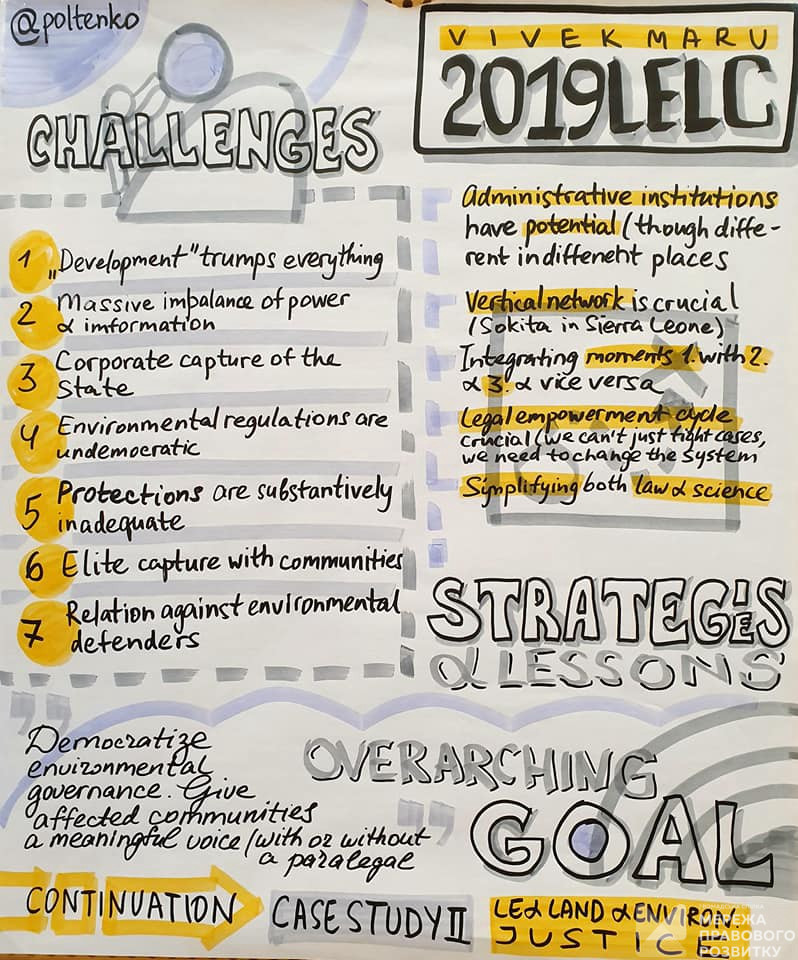
Day 4 “When you can’t see the problem, you can’t solve the problem”
Legal Empowerment and Gender Equality
It was a very informative session. All of the crimes against women have more issues involved in them than one. The session began with an impressive quiz of a lot of statistics about gender justice and discrimination against women around the world. There is structural discrimination against women. On the surface though there are so many anti-discrimination laws in place, but in practice, there is structural discrimination. It’s not easy to identify their problems, because it’s hidden and it akes effort.
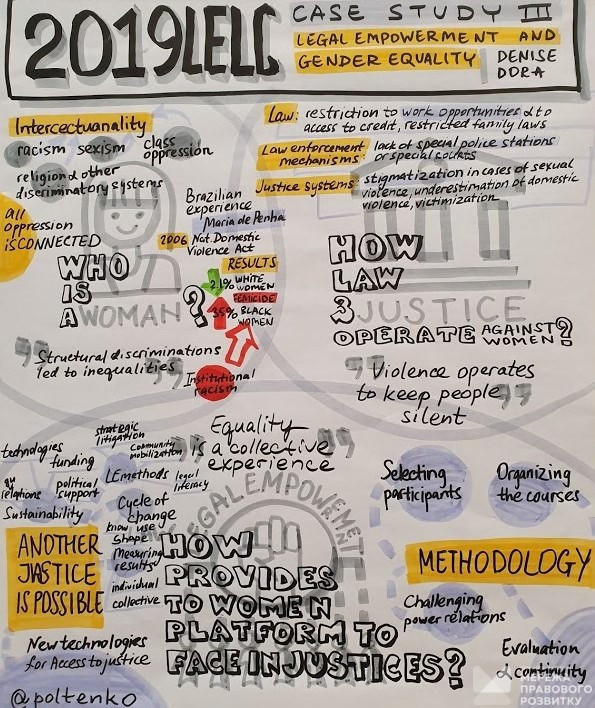
There are oppressive systemic patterns present throughout the world as mechanisms or law and systems of justice are not adapted to the needs of the affected communities. In the second half of the first session, the participants divided into regional groups (South Asia, South East Asia, Europe, Americas, Africa) to discuss a case scenario of gender based issued in the context of regional laws.
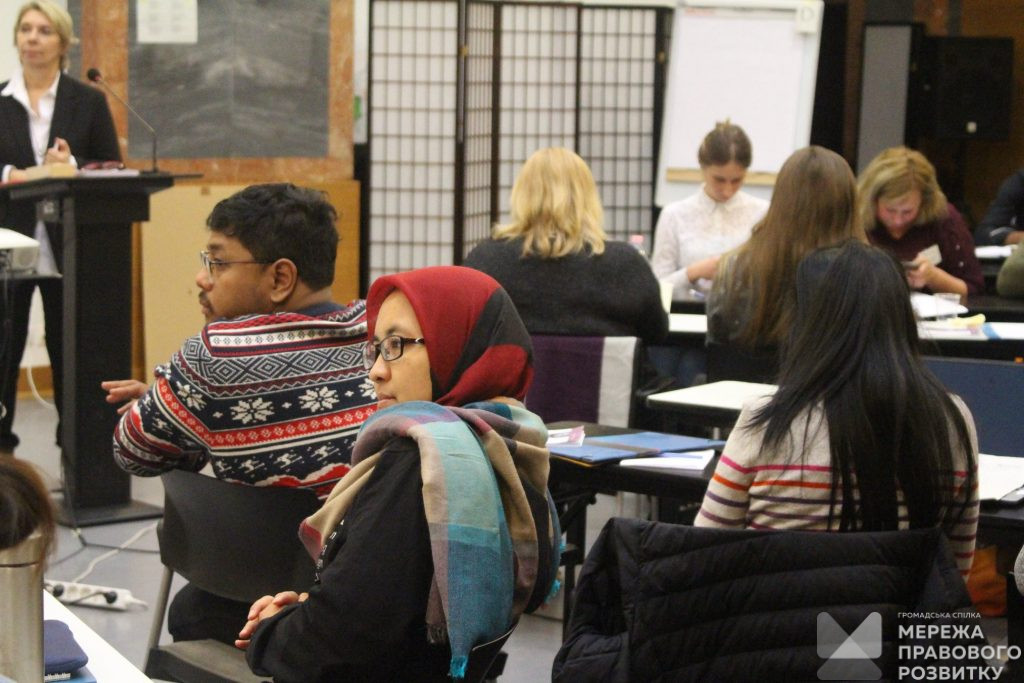
Later in the case study session we discussed strategies that people in their context to solve their cases and we could use the learning from these strategies for us.
Paralegal recognition, accreditation and sustainability
The participants spoke about recognition and accreditation of paralegal work and their sustainability while at the same time not to compromise in the independence they have in working.
2 case studies were delivered: talked about paralegal movement in Sierra Leone and about the non-lawyer recognition in the US.
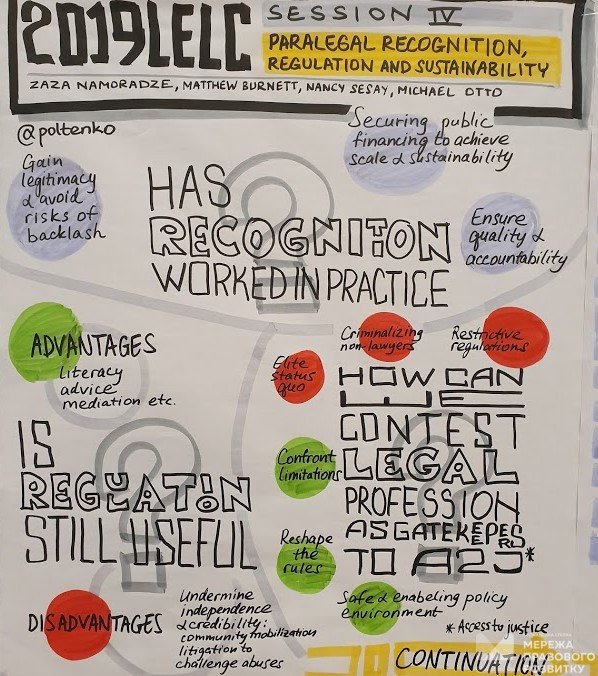
Divided into regional groups the participants discussed two questions:
– Whether or not recognition is required/good?
– Tradeoffs of paralegal recognition or if recognition still useful?
There were a lot of interesting comments on recognition coming from the context of different countries.
Skills Sessions
1. Innovative Financing – talked about sustainability of a project. How to get resources, allocate them or use them. The participants had a good exercise on planning an idea for a social enterprise. What it can be done to make profit, benefits, allocation of profit for development. Testing the idea of social enterprise before implementing it.
2. Community surveying – everyone can conduct a community-led survey – was a major takeway from the session. Key principles of community surveying: how people must be involved, how to identify the questions which should be based on your needs and not on your donor organization’s needs. Project mapping to see who are we working with at the moment and who could we work with to conduct a survey. Power mapping and advocacy strategies: the participants talked about the definitions of people/authorities involved in mapping process for example organizations who are your allies and who oppose you. The power axis and using live examples from participants to do the mapping. Lot of examples on how we can use power mapping.
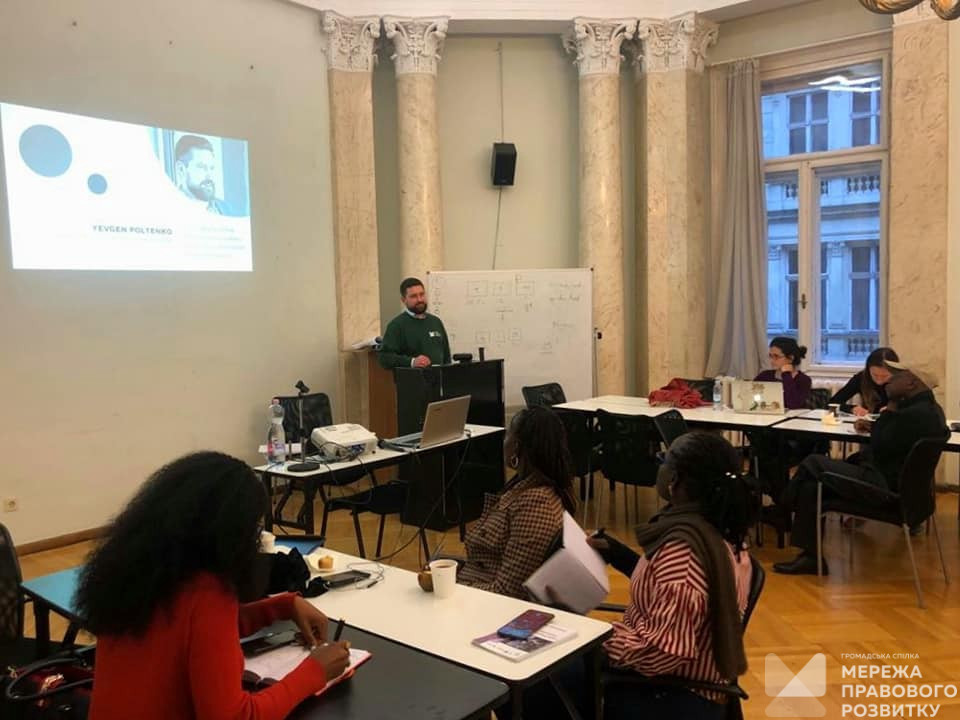
3. Advocacy strategies: it was a case study of Kenya about the civil war, crimes during it and the subsequent strategies used to avoid such situation in future and make the perpetrators accountable for their crimes.
Day 5 and final
2019 Legal Empowerment Leadership Course is over. On the fifth and final day participants elected yesterday by their working groups have an opportunity to present their action plans.
Martha Sharon Opilli, Kenya:
“In many situations cost is an obstacle to access to justice but there is more to Legal Empowerment than just cost… The ability to Know, Use and Shape the Law that enables the strategic shift from People as beneficiaries or recipients of legal services to people as seekers of Justice and claimants of Rights… From helplessness and inaction to action asserting rights and resisting violations.”
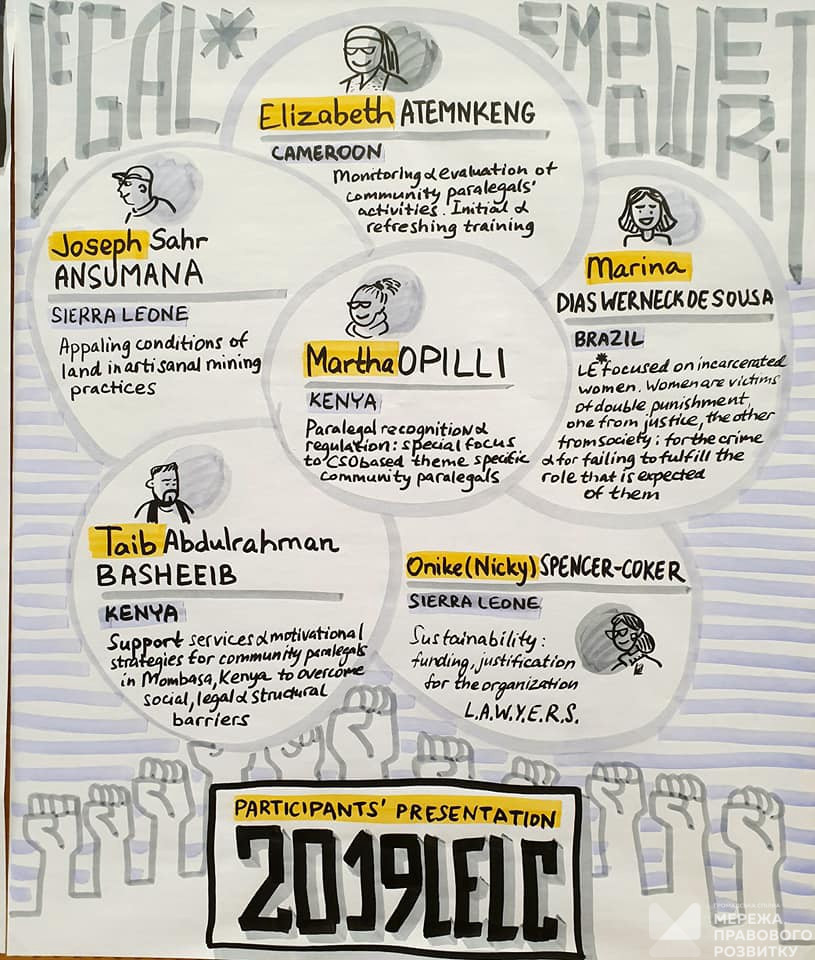
The 2019 Course definitely contributed to the goal of the Global Legal Empowerment Network which is to cultivate a vast global movement for legal empowerment: one capable of mobilizing millions to collectively tackle the greatest justice challenges of our time. The global network weaves experiences together to create an expanding universe of opportunities for learning and collaboration.
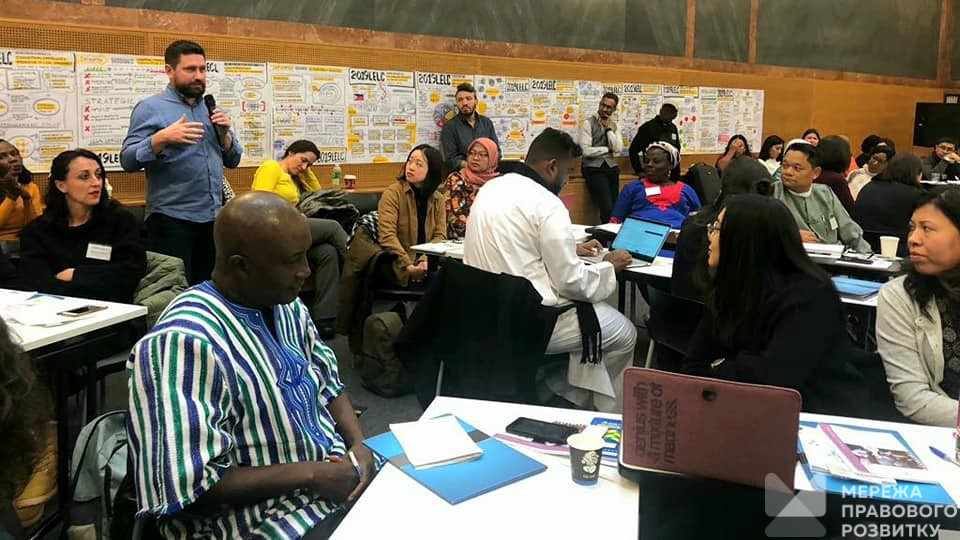
New wave of global cadre of leaders who are committed to growing the movement for legal empowerment look forward to implementing the network’s 2020-2022 avenues:
– encouraging deeper learning,collaboration, and advocacy atthe REGIONAL level
– leveraging TECHNOLOGY to reachand serve more members
– hosting our first-ever GLOBAL CONVENING to advance ourcollective advocacy and learning agendas
– collaborating with SOCIAL MOVEMENTS and reaching new audiences
P. S. In June 2024, the Legal Development Network (LDN) launched a crowdfunding campaign, Recovery of The South of Ukraine , as part of the crisis response program #StandWithUkraine.
You can Recovery of The South of Ukraine |
If you have notices an error on the web-site, please, highlight the text and press ctrl-enter.
Have you found your solution? Help others!
Print a poster
Print and place the Network's poster on a notice board in your entrance hall
Become a volunteer
Become a volunteer and assist others in finding problem solutions
Do you need a consultation ?
Online chat
Ask question and one of the LDN's lawyers
will answer it.
Chat's schedule: from 10 to 16
every day
Chatbot
Ask questions via LawLink Bot in any convenient way. LawLink Bot is a smart and digital legal assistant created by the Legal Development Network.

Our initiatives
The Legal Development Network implements comprehensive projects aimed at strengthening human rights, developing capable communities, and building sustainable tools for access to legal aid. We work at the intersection of advocacy, legal education, and local coordination of humanitarian response.
